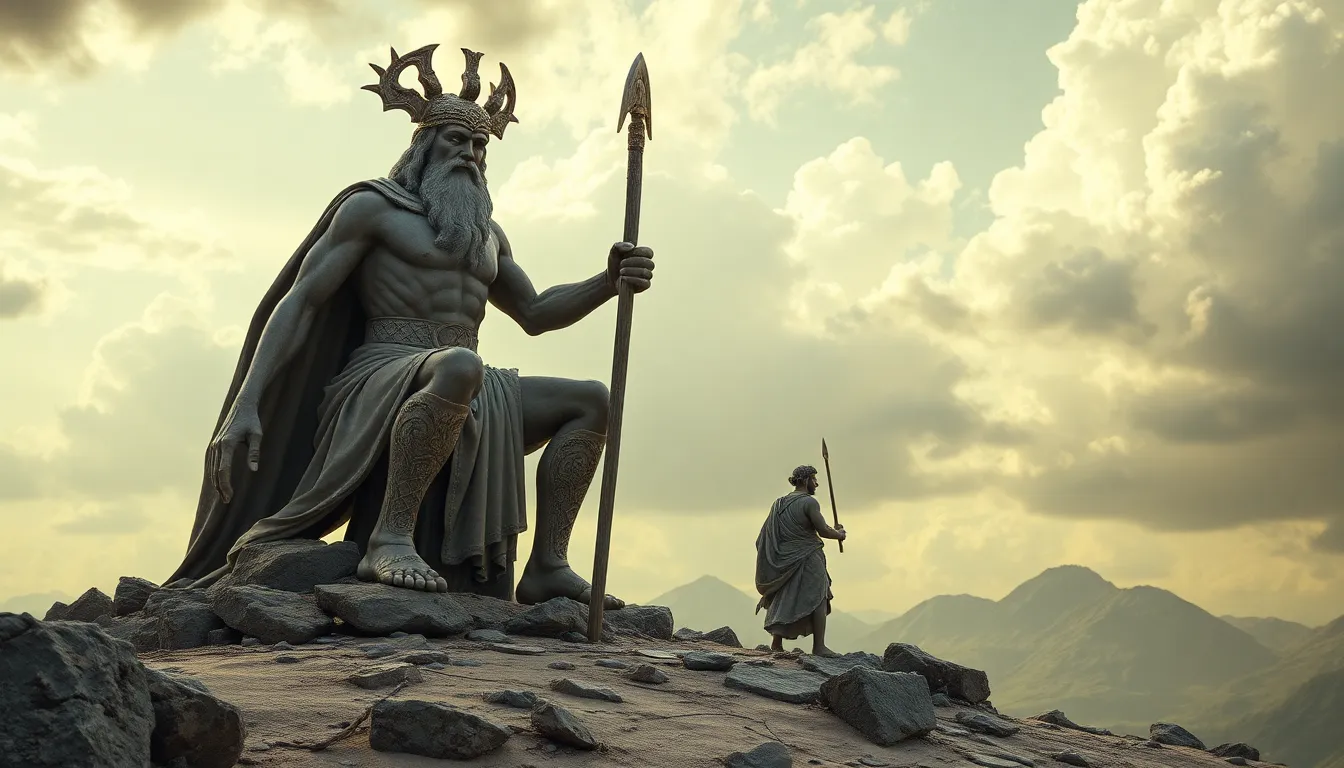The Titan Atlas: A Story of Sacrifice and Strength
I. Introduction
Greek mythology is a rich tapestry of stories that explore the complexities of human nature, the divine, and the universe. Among the pantheon of deities and mythological figures, the Titans hold a significant place, representing the primordial forces that shaped the world. One of the most notable Titans is Atlas, whose story is imbued with themes of sacrifice and strength. This article delves into the life of Atlas, examining his origins, burdens, and the profound lessons his tale imparts.
II. The Mythological Background of Atlas
Atlas is a figure of great significance in Greek mythology, known primarily as the Titan condemned to hold up the heavens. His origins trace back to the primordial deities, as he is often considered a descendant of Uranus (the sky) and Gaia (the Earth). In the vast landscape of Greek mythology, Atlas is categorized among the Titans, a group of powerful beings who ruled before the Olympian gods.
During the Titanomachy, the great war between the Titans and the Olympians, Atlas played a crucial role. Rather than supporting the Titans in their rebellion against Zeus and his siblings, he found himself on the losing side. As punishment for his participation in the Titanomachy, Zeus condemned Atlas to bear the weight of the heavens for eternity, a task that would define his existence.
III. The Burden of the Heavens
The most enduring image of Atlas is that of a mighty figure straining under the weight of the sky. This punishment symbolizes not only a physical burden but also an emotional and spiritual one. The act of holding up the heavens is often interpreted as a metaphor for responsibility and the weight of duty.
- Symbolism of Atlas’s Burden: The heavens represent the cosmos, the world, and the divine order. By bearing this weight, Atlas embodies the struggle of maintaining balance in a chaotic universe.
- Emotional and Physical Toll: The eternal task of holding up the sky is not just a physical strain; it also reflects the emotional toll of isolation and despair. Atlas is forever separated from his kin, forced to endure a solitary existence.
IV. Themes of Sacrifice in Atlas’s Story
At the heart of Atlas’s narrative lies the theme of sacrifice. Sacrifice is a prevalent motif in mythology, often portrayed as a noble act that comes at a great personal cost. Atlas’s sacrifices are manifold, showcasing the depth of his character.
- Personal Sacrifices: Atlas’s decision to stand against the Olympians led to his punishment, highlighting the sacrifices made for loyalty to his kin and fellow Titans.
- Comparison with Other Mythological Figures: Much like Prometheus, who sacrificed his freedom to bring fire to humanity, Atlas embodies the spirit of selflessness, accepting his fate for the greater good of his family.
V. Strength as a Central Theme
Strength is another central theme in the story of Atlas, manifesting in various forms. His physical strength is evident in his ability to support the heavens, but equally important is his emotional resilience.
- Physical Strength: Atlas is depicted as a towering figure, often shown in art and literature as a symbol of brute force and endurance.
- Emotional Resilience: The ability to withstand his punishment and maintain a sense of purpose despite his suffering speaks to a deeper kind of strength that many can relate to.
Atlas’s strength has been immortalized in various artistic representations, ranging from ancient sculptures to modern interpretations in film and literature, each capturing the essence of his burden and resilience.
VI. Atlas in Popular Culture
Atlas’s story has transcended ancient mythology, finding its way into modern literature, art, and popular culture. His image continues to resonate with audiences, symbolizing the struggle against overwhelming odds.
- Representation in Modern Literature: Authors have drawn on Atlas’s narrative to explore themes of struggle and perseverance, often using his story as an allegory for personal challenges.
- Influence on Contemporary Themes: The figure of Atlas is frequently invoked in discussions about resilience, responsibility, and the human spirit’s capacity to endure hardship.
- Examples in Media: Films such as “Clash of the Titans” and literary works like “The Atlas Shrugged” by Ayn Rand illustrate the enduring legacy of Atlas in modern storytelling.
VII. Lessons from the Tale of Atlas
Atlas’s tale offers profound insights into the human experience, providing lessons that resonate across time and culture.
- Enduring Human Spirit: Atlas embodies the resilience of the human spirit, serving as a reminder that we can endure great burdens.
- Importance of Responsibility: His story emphasizes the significance of duty and responsibility, illustrating that actions have consequences, often impacting others.
- Insights into Personal Sacrifice: Atlas’s sacrifices encourage reflection on our own lives, prompting us to consider what we are willing to give up for the greater good.
VIII. Conclusion
In conclusion, Atlas stands as a powerful symbol in Greek mythology, representing both sacrifice and strength. His story, marked by profound burdens and emotional resilience, continues to resonate in contemporary culture. As we reflect on Atlas’s significance, we recognize the universal themes of sacrifice and strength that define the human experience. Through his tale, we are reminded of our capacity to endure and the importance of our responsibilities, inspiring us to confront our challenges with courage and determination.




